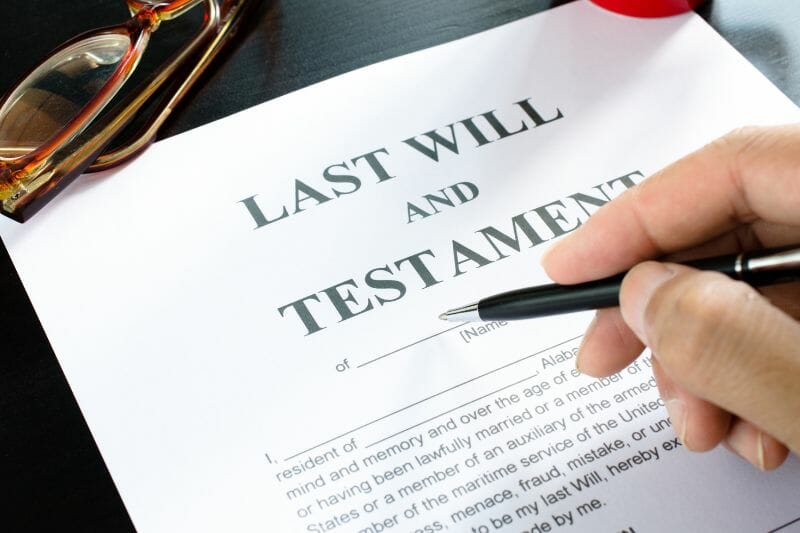A guide to selling a probate or inherited property
Selling a probate or inherited property can be a complicated business, depending on the size of the estate. That’s why we’ve created this introductory guide. Bear in mind that it’s based on our personal experience and doesn’t constitute legal advice. However, we can, on request, put you in touch with experienced, trustworthy solicitors with a strong understanding of the local property market.
We’d also be delighted to have a zero-obligation, confidential chat with you about your own situation.

A brief guide to probate
When selling a property a relative has left behind, probate is often involved. But what is it?
Probate is the formal permission needed to deal with someone’s estate – the property, money and possessions left on death.
If you’re named in the deceased’s will as an executor, you can apply for probate. But even if they didn’t leave a will, depending on your relationship to them, you can still apply to become their estate’s administrator. In most cases, you’ll need legal permission to sell their property, which is why you need to apply for probate.
Preparing a property
Before you apply for probate, it’s a good idea to be prepared if a property forms part of the estate. Here’s what you need to do:
- Estimate the value of the deceased’s assets.
- From a property perspective, it’s always wise to get two or three valuations from respected local estate agents.
- Be very clear on any valuation, since this may have inheritance tax implications further down the line. We suggest contacting HMRC or a solicitor who can offer professional advice.
Applying for probate can take between four and eight weeks. However, you are allowed to market a property for sale during this time while you wait for probate to be granted.
Please note
You won’t be able to complete the sale of the property without probate. But don’t worry if you’re still feeling unsure of things.
This is where a good solicitor with links to a reputable local estate agent can be hugely beneficial and take away a lot of the stress you may be experiencing.

A guide to selling a probate or inherited property
Selling under these circumstances can seem emotional and challenging. There can be a great deal to think about, and quite a few loose ends to tie up.
It’s easy (and natural) to overlook some of the things you need to do. Below we’ve listed five often missed things which will need your attention.
Five things to consider
1 – Letting go
Don’t underestimate the sentimental importance of a loved one’s items. Clearance of their belongings and furniture needs to be handled with care and sensitivity. Wherever possible (and after legal advice), it’s often a good idea to gather the family together to see who wants what and to decide which items can be taken by a clearance company or go to charity shops.

2 – Security and maintenance
If you’re applying for probate, the property in question could be vacant for months. This means you need to think about the security of the home. Maintenance can also be an issue. In the colder months, you’ll need to check the heating and water systems regularly. When it’s warmer the outside of the property may need care, especially since many potential buyers will be put off by photos of overgrown gardens or broken fence and gates.
3 – Insurance cover
This is often overlooked when a homeowner has died and the property lies empty. You should contact your insurance company to explain the situation and ask what levels of cover are available. Most providers offer ‘vacant property insurance’; a necessary cost for any property left unoccupied for more than 30 days.

4 – Keeping it in the family
Once probate is granted, selling to a family member may seem a relatively easy option. However, it can work out to be more complicated than a sale to someone you don’t know. This is because of the need to agree on a suitable price and work to a timeline, not to mention the emotions which are sometimes involved.
5 – Quick sale caution
There are many companies out there promising to buy properties quickly for cash. And, as attractive as a quick cash sale can sound during a testing period of your life, you and any other beneficiaries of the sale can end up thousands of pounds out of pocket. This is because the property won’t have been professionally marketed in the way it would be if you sold it through a reputable, local estate agency.


We answer your questions
Over the years that we’ve been helping people with their inheritance and probate sales, people have asked us a lot of questions! You may find some of the answers over the next couple of pages helpful.
How will I know I’m getting an accurate valuation for sales and tax purposes?
Any agent can pluck a juicy-looking figure out of the air. But be warned: proceed with caution when you come across this approach. You need to employ a little healthy scepticism. Ask for comparable evidence to back up any valuation, showing similar properties in the area achieving the suggested price. Successful sales provide good clues as to an agent’s skills; equally, you need proof that the property was valued accurately.
Does it cost more to sell a probate property?
The sale shouldn’t incur higher legal fees than a standard property sale. However, there are other extra costs to consider, including insurance and maintenance.
I don’t live locally; how will you handle viewings?
We’ll accompany all viewings as standard procedure. And, as a local estate agent, we’ll also visit the property regularly to check everything is OK. We can also arrange for local tradespeople to carry out any maintenance that needs doing, and we work with trusted house clearance firms based nearby.
Can I market the property while I’m awaiting probate to be granted?
The short answer to this question is yes, although you cannot legally complete the sale until probate has been granted.

How would you market the property?
We apply a different strategy to each property – because no two properties or sellers’ situations are the same.
Essentially, we look at three core areas once a client has instructed us to work for them:
1) Location – Where the property is and the amenities, services and environment around it.
2) Presentation – What condition is the property in – and how could this be improved if necessary?
3) Process – As mentioned above, any agent can promise an amazing-sounding price. What is far more beneficial to you is knowing the process your agent will follow to achieve the best price.
What is the difference between using an estate agent and going or a quick-buying service?
While cash-buying companies may provide a faster route to completion, using these services often means you miss out on thousands. As a trusted estate agent working as your support partner throughout this process, we’ll be on hand to guide you every step of the way. You’ll have access to our extensive network of nearby contacts and benefit from our in-depth local knowledge plus our database of people looking to move. So we’re very confident we will achieve the best possible price for your property, with minimal stress and disruption.
Should I refurbish the property so it’s ready for sale?
It’s true that a fresh coat of paint never goes amiss. But you might not need to spend as much as you think. Each property is different, but our advice would be just to make the property as clean and clutter-free as possible. We can recommend trusted local companies who handle house clearance, cleaning, maintenance and repairs. Gardens are increasingly in demand since the pandemic. So if your property has one, ensure the front and back areas are neat, tidy and generally easy on the eye.
What should I do about Inheritance Tax (IHT)?
This is a complex area and different properties fall under separate tax brackets. We wouldn’t advise the DIY Google route – instead speak to your accountant, solicitor or other qualified IHT adviser. This way you can avoid any unexpected tax bills.

Your moving home checklist
Below is an 11-point checklist to help you prepare for a sale
- If probate is involved, arrange a call with a solicitor who is experienced in this area.
- Speak to your accountant or tax adviser about any inheritance tax issues.
- Get three estate agents to value the property.
- Choose the agency who provides the evidence to back up their valuations.
- If the property has valuable items, it may be worth getting an auctioneer to value them. Check with your solicitor to see if any legal implications apply to the probate before doing this.
- Arrange for a house-clearance company to visit the property, if required.
- Get a cleaning company to attend the property, if necessary.
- Ensure that the drainage and heating systems have been checked.
- Take out vacant property insurance. Sometimes insurers will insist that the previous step has been taken before issuing cover.
- Create a safe place for any paperwork you may need to access.
- Instruct your agent to start marketing the property following the process they have in place.
If you have any questions about anything in this guide, remember we at Oakfield are here to help. Feel free to contact us on any of the numbers or email us as follows:
Bexhill Branch
12 Sackville Road
Bexhill-on-Sea
East Sussex
TN39 3JL
01424 224700
bexhill@oakfieldproperty.co.uk
Eastbourne Branch
35 Cornfield Road
Eastbourne
East Sussex
BN21 4QG
01323 723500
eastbourne@oakfieldproperty.co.uk
Hastings Branch
60 – 61 Robertson Street
Hastings
East Sussex
TN34 1HY
01424 722122
hastings@oakfieldproperty.co.uk
